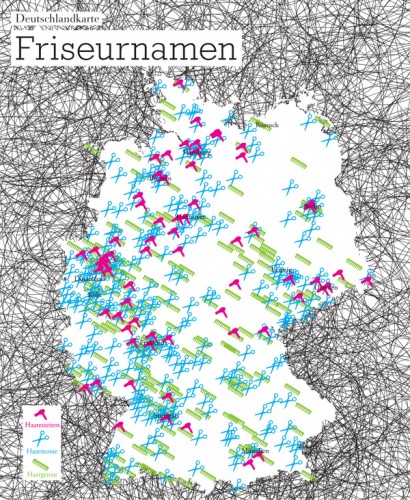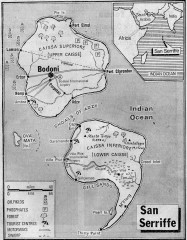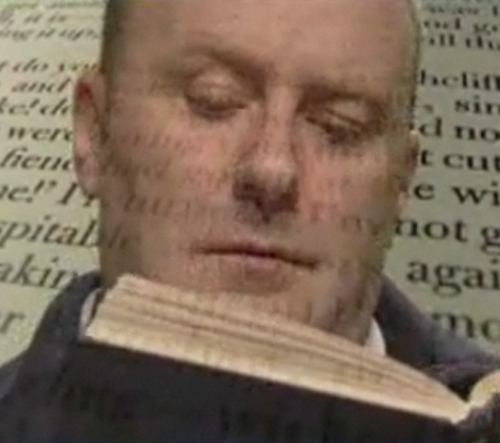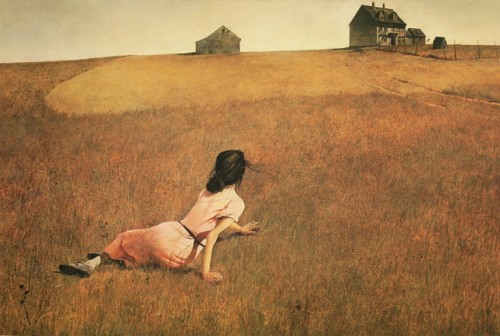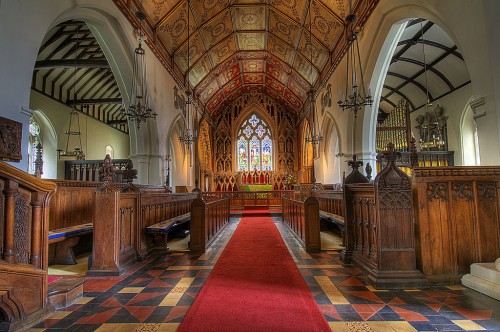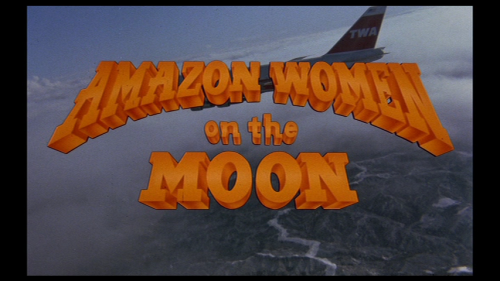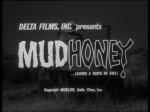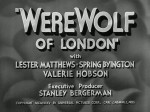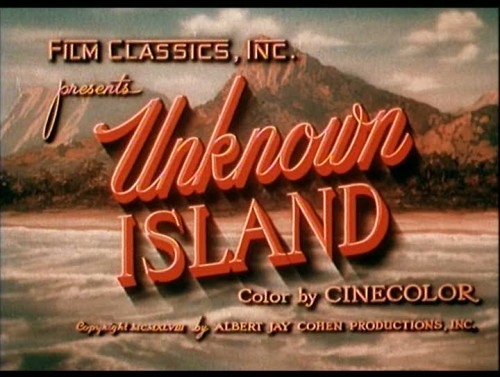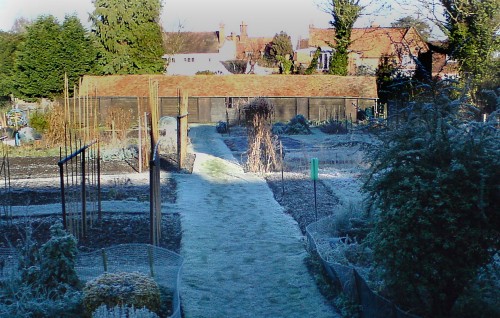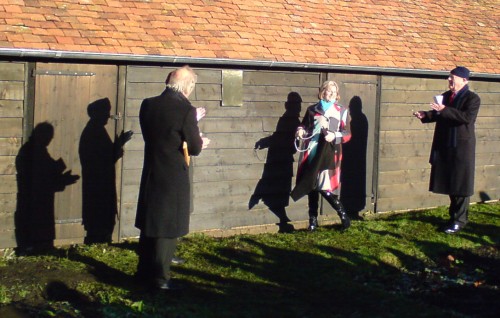diaphania - Page 3
-
In the garden today
Spring will soon be here. -
Hair affairs
From the site Strange Maps comes this record from Die Zeit of the popularity of awful puns in the names of German hairdressing salons. The most popular is 'Haarmonie'. The others uphold that unfortunate line about the missing Germanic funny bone: Haareszeiten puns on Jahreszeiten - which means seasons - and Haargenau just means 'exactly' in the sense of 'to a hair'.Enertaining whimsy, including the menacing hairy outer darkness surrounding Germany, but not very effective map-making. I wanted the map to be dynamic, revealing photos of shop signs, much like the ones featured in the Hairdressers With Funny Names Pool on Flickr.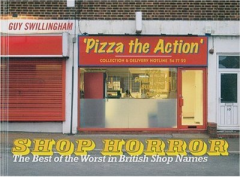 The predeliction of English salons for this kind of linguistic tomfoolery is so great that they made up a good part of a Guy Swillingham's Shop horror: the best of the worst in British shop names. If you can excuse a comment about one map which is made up of 'mere typography' Strange Maps has many other gems, including a description of the Guardian's April 1977 feature on San Seriffe
The predeliction of English salons for this kind of linguistic tomfoolery is so great that they made up a good part of a Guy Swillingham's Shop horror: the best of the worst in British shop names. If you can excuse a comment about one map which is made up of 'mere typography' Strange Maps has many other gems, including a description of the Guardian's April 1977 feature on San Seriffe -
Why Reading Matters
Not the place but the activity. Rita Carter presented a one hour programme on BBC Four that could easily have been a series.
This was a terrifically fudged programme. Rita Carter is an experienced science writer, with a special interest in the workings of the brain but she skirted some of the big issues, failed to come to a serious conclusion beyond confirming the validity of the programme’s big idea and let drop such solecisms as ‘the brain was designed’.
None of these points were made by the programme:
- more money is now made from computer games than books
- public libraries are closing across the country
- boys in particular continue to read less and less
Some of the most interesting points were in the first half of the programme:
- reading requires multiple brain zones, which have adapted from other functions and which continue to develop when you read
- because of its difficult structure, reading English requires more mental effort than other languages – which may have developmental significance for the brain as a whole
Some interesting ideas were floated but remained unsubstantiated:
- computer games may require less empathetic involvement than reading (no hint at the wider social implication of a whole generation of adolescents now more likely to walk by on the other side)
There was no attempt to pick up on the differences between reading a novel and reading the web, or between reading plain text or text with images, or even listening to a book being read and reading it.
There wasn’t any sense of where UK Government policy is on the issue.
But yes, reading books is a precious thing.
-
Mind the breaks
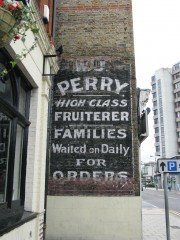 Sign spotted by James Wallis in King's College Hospital, and posted to Flickr.Some of the best sign-related groups on that site are collections of fading wall advertising, like these two examples. Besides the visual appeal, the lettering is social history. Our local corn merchants is now a Chinese restaurant. There'll be no more bicycle deliveries for the fruiter's boy. Fruit and veg is so much better travelled these days and we are all the richer for year-round strawberries, aren't we?
Sign spotted by James Wallis in King's College Hospital, and posted to Flickr.Some of the best sign-related groups on that site are collections of fading wall advertising, like these two examples. Besides the visual appeal, the lettering is social history. Our local corn merchants is now a Chinese restaurant. There'll be no more bicycle deliveries for the fruiter's boy. Fruit and veg is so much better travelled these days and we are all the richer for year-round strawberries, aren't we?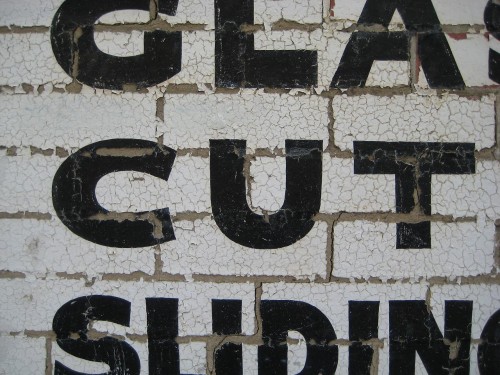
-
Cheesed off by isolationism
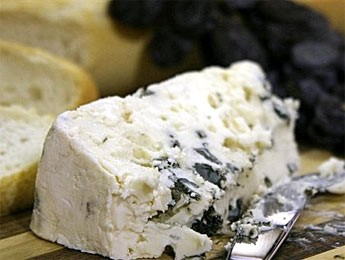 Just as President Bush was 'deeply mourning' the death of Andrew Wyeth, his administration was being derided for one of its last balmy acts. A 300% tariff is being imposed on one particular French cheese. Whilst the rest escape with a mere 100% penalty in retailation for French refusal to accept US hormone-treated beef, only Roquefort rejoices in the distinction of being placed firmly beyond the reach of American consumers. Whether or not US goat's cheese makers are celebrating their new found commercial advantage is hard to say, but French farmers are telling a very different story. Last time they were punished in this way they burnt down a Mcdonalds. But a reprieve may be imminent. In the hope that he will wake up and smell the fromage, President Elect Obama has been sent a sample of the blue-veined product.
Just as President Bush was 'deeply mourning' the death of Andrew Wyeth, his administration was being derided for one of its last balmy acts. A 300% tariff is being imposed on one particular French cheese. Whilst the rest escape with a mere 100% penalty in retailation for French refusal to accept US hormone-treated beef, only Roquefort rejoices in the distinction of being placed firmly beyond the reach of American consumers. Whether or not US goat's cheese makers are celebrating their new found commercial advantage is hard to say, but French farmers are telling a very different story. Last time they were punished in this way they burnt down a Mcdonalds. But a reprieve may be imminent. In the hope that he will wake up and smell the fromage, President Elect Obama has been sent a sample of the blue-veined product. -
Entire of itself
No man is an island, entire of itself; every man is a piece of the continent, a part of the main. If a clod be washed away by the sea, Europe is the less, as well as if a promontory were, as well as if a manor of thy friend's or of thine own were. Any man's death diminishes me, because I am involved in mankind; and therefore never send to know for whom the bell tolls; it tolls for thee.
John Donne, Meditation XVII, 1624
The painter Andrew Wyeth died yesterday, reminding me of the first time I saw 'Christina's World'. I was about 8 and there was a tiny reproduction of the painting in my father's Reader's Digest art book. I felt for the girl so far from her scary looking home. What was her expression? Was she worried or was she happy? In fact Wyeth's subject (if not his model) was a young woman called Christina Olson (1893-1968) who may have had polio. The Olsons were friends of Wyeth's wife, and for 30 years he had a studio in their house in Cushing, Maine.
 Christina lived there all her life, shunning medical intervention, and refusing the description of 'crippled' which people tried to apply to her. Wyeth painted her with what may now seem like mawkish poignancy, crawling back from a visit to the family cemetery where she herself is now buried. Wyeth's wish for pathetic effect shows in his sketch for the painting.
Christina lived there all her life, shunning medical intervention, and refusing the description of 'crippled' which people tried to apply to her. Wyeth painted her with what may now seem like mawkish poignancy, crawling back from a visit to the family cemetery where she herself is now buried. Wyeth's wish for pathetic effect shows in his sketch for the painting.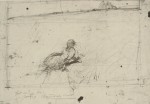 Andrew Wyeth was part of a dynasty of artists: he was taught by his father and his son is a successful artist. The Reader's Digest text describes Wyeth as 'financially the most successful painter working in America now'. A review in Time describes 'Wyeth's problematic legacy'. Like the Scottish painter Jack Vettriano Wyeth is a little too popular and certainly much too meticulously figurative to meet with mainstream critical approval.
Andrew Wyeth was part of a dynasty of artists: he was taught by his father and his son is a successful artist. The Reader's Digest text describes Wyeth as 'financially the most successful painter working in America now'. A review in Time describes 'Wyeth's problematic legacy'. Like the Scottish painter Jack Vettriano Wyeth is a little too popular and certainly much too meticulously figurative to meet with mainstream critical approval.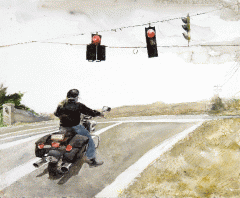 What strikes me now about 'Christina's World' is Wyeth's ability to evoke a sense of place. But it's a place that is edgy, disturbing, unreal, unattainable. The same emptiness and isolation is in his later work, but without the hard-edged light and luridness of Edward Hopper's art with which Wyeth's paintings have so often been compared.
What strikes me now about 'Christina's World' is Wyeth's ability to evoke a sense of place. But it's a place that is edgy, disturbing, unreal, unattainable. The same emptiness and isolation is in his later work, but without the hard-edged light and luridness of Edward Hopper's art with which Wyeth's paintings have so often been compared. -
Iced over
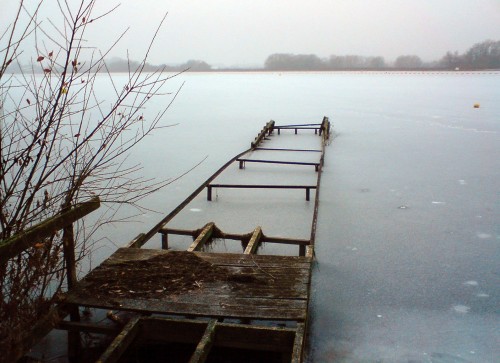 A favourite spot for outdoor swimming looked less than inviting today. Freezing temperatures didn't stop thousands of hardier souls taking to the water on Boxing Day, nor will it deter participants at the UK Cold Water Swimming Championships, at the unheated Tooting Bec Lido on 24 January.
A favourite spot for outdoor swimming looked less than inviting today. Freezing temperatures didn't stop thousands of hardier souls taking to the water on Boxing Day, nor will it deter participants at the UK Cold Water Swimming Championships, at the unheated Tooting Bec Lido on 24 January.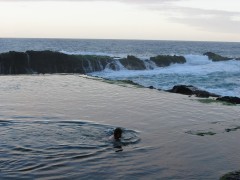 Counter-culture doesn't just mean hippies or punks. A growing community of mildly rebellious people with a healthy disrespect for 'elfensafety' swim in lakes, rivers, tidal pools and 'water-holes'. A raft of sites and forums promote wild swimming, inspired by Roger Deakin's Waterlog, which is a magnificent celebration of bathing all year round in Welsh mountain pools, Cornish holy wells, trout streams and lidos. Deakin died in 2006. There are photographs of his idiosyncratic living arrangements at the house he built at Walnut Tree Farm (including the moat that inspired him to write).
Counter-culture doesn't just mean hippies or punks. A growing community of mildly rebellious people with a healthy disrespect for 'elfensafety' swim in lakes, rivers, tidal pools and 'water-holes'. A raft of sites and forums promote wild swimming, inspired by Roger Deakin's Waterlog, which is a magnificent celebration of bathing all year round in Welsh mountain pools, Cornish holy wells, trout streams and lidos. Deakin died in 2006. There are photographs of his idiosyncratic living arrangements at the house he built at Walnut Tree Farm (including the moat that inspired him to write).Deakin had a natural gift for the most economical prose. His description of a kingfisher '"streaking by in an afterburn of blue" took me back to a swim below the weir here. As I bobbed in the water midstream, a pair of kingfishers flashed before me, tugging at either end of a twig.
'Sweet water' perfectly describes the sensation of immersion in inland waters. Even outdoor chlorinated pools will give you asthma, salt stings, but fresh water has an earthy softness like nothing else.
-
Waiting at midnight
In Yeats' 'Second Coming (Slouching towards Bethlehem)' his concern was Ireland's struggle:
Things fall apart; the centre cannot hold;
Mere anarchy is loosed upon the world,
The blood-dimmed tide is loosed, and everywhere
The ceremony of innocence is drowned
The best lack all conviction, while the worst
Are full of passionate intensity.In our village church on Christmas Eve the candles were lit, every window ledge decorated, every pew filled and there was an expectant buzz of chat just before the lights went down: the familiar, lilting solo of the first verse of 'Once in Royal David's City', then the congregation of 400 or more swelled the sound, familiar incantations that span me back to a dozen or more fortunate Christmasses before. You can find stables round here, sheltering not oxen but ponies, much-loved mounts of Cressidas or Saras. Our cattle sheds will set you back around £1m. These days they've all been converted to executive homes for the less than poor or mean or lowly.
From the priest's welcome to the final blessing, the service runs like clockwork. The same carols, in the same order, latecomers pushing in from the pub, the brisk filing up to the communion rail, busy white gowned servers administering bread and wine, then back down the north aisle, faces respectfully downcast, expressions of assumed solemnity.
The sermon quotes Betjeman, not the bible.
And is it true,
This most tremendous tale of all,
Seen in a stained-glass window's hue,
A Baby in an ox's stall ?
The Maker of the stars and sea
Become a Child on earth for me ?
And is it true ? For if it is,
No loving fingers tying strings
Around those tissued fripperies,
The sweet and silly Christmas things,
Bath salts and inexpensive scent
And hideous tie so kindly meant,
No love that in a family dwells,
No carolling in frosty air,
Nor all the steeple-shaking bells
Can with this single Truth compare -
That God was man in Palestine
And lives today in Bread and Wine.
(from Christmas by John Betjeman)In my own heart hope and doubt mingle equally.
Pope Benedict was widely reported just before Christmas as saying 'that saving humanity from homosexual or transsexual behaviour was just as important as saving the rainforest from destruction' (Irish Times). His actual words are far less simplistic, but what kind of Christmas message was this? When dogma collides so catastrophically with the secret God of the heart (the God that knows all and accepts that which is meant to be), where is the good in organised religion?
Soon after Christmas on Radio 3's 'Belief' Cambridge academic Tim Winter (Abdal Hakim) was questioned with gentle persistence by Joan Bakewell about his conversion to Islam:
I always wanted to have the person of Jesus who I was brought up with and who is an extraordinary world figure... as part of my religious vision of the world. Islam is the only non-Christian religion where He's really important, but actually comes closer to you in a strange kind of way, because in the orthodox Christian understanding, He is man but also God. And I couldn't figure out how you can actually be human if you're also God. So in a strange kind of way I felt that one of the consequences of becoming Muslim was to become much closer empathetically, humanly, to the person of Jesus than I'd ever managed as an Anglican.
His answers are revealing when he is held to account on September 11, on women and democracy in Islam. He ends with his struggle to conform:
...you go through the door, and then the reality of religion is before you, which is ultimately about loving and adoring God, loving and adoring His creation, which is endlessly brilliant, beautiful, rigorous, difficult, fascinating. And trying to represent in one's own life a conformity to how God wants His servants to be. And that's difficult. Learning how to pray is easy, but actually conforming in the depths of one's being to what the divine, benign nature wants us to be - that's the real challenge. And I'm still working on that.
The 'little town of Bethlehem' is now, like the Gaza Strip, a Palestinian territory. There's been less dreamless sleep for the Gazans since the Israeli invasion this Christmas. One religion-dominated community is yet again beating the hell out of another. What hope now for the bi-national solution imagined by humanist Edward Said?
O little town of Bethlehem
How still we see thee lie
Above thy deep and dreamless sleep
The silent stars go by
Yet in thy dark streets shineth
The everlasting Light
The hopes and fears of all the years
Are met in thee tonight
O holy Child of Bethlehem
Descend to us, we pray
Cast out our sin and enter in
Be born to us today
We hear the Christmas angels
The great glad tidings tell
O come to us, abide with us
Our Lord Emmanuel -
A psychotronic new year
If it's low budget, scary or a bit brutal then it's psychotronic. The term was dreamt up by Michael Weldon after he reviewed hundreds of quirky and obscure films including the 1980 Chicago cult sci-fi title The Pscychotronic Man. The sometimes brilliantly expressive hand-rendered titles are probaby the highlights. They run from 'The Adventures of Buckaroo Banzai' to 'Zontar: the Thing from Venus' and include spaghetti westerns, horror and exploitation films, made for a quick profit with little thought for merit.
These images are from a collection made by Mr. Bali Hai. Lettering has never been scarier. See also the title sequence for Le Souffleur at The Art of the Title: one of the few recent examples on this site where the lettering is more important than the underlying images.
-
Shadows on the allotment shed wall
Once upon a time almost everyone could rent a patch at their local allotment garden – a haven of tranquillity where you could grow healthy food and enjoying working alongside your neighbours. In 1943 there were 1.4 million allotments in the UK but by 1993 there were just 300,000. In London today just 30,000 people have an allotment, and in some districts waiting lists are decades long.The Allotment Act is 100 years old. After being decimated by opportunistic developers and greedy councils, these little Edens are suddenly a hot topic, with a debate in Parliament this summer and a slew of active websites campaigning for them. In spite of all that few councils are likely to respond to the Act's obligation to provide an allotment garden at the request of "six registered parliamentary electors or ratepayers".
Locally at least, allotments are thriving. Today (and for the first time in her parliamentary career) Theresa May MP opened some sheds. Not your average tumbledown shack where something nasty lurks in the shadows, but listed, oak-beamed and tile-hung allotment sheds, carefully restored by a bunch of energetic volunteers in memory of a lecturer and enthusiastic allotment-holder called David Penny.
Nor were followers of Ms May's footwear disappointed, since she sported not green wellies but fetching knee-high black leather boots.
-
Following the diagram in Lisbon
In Lisbon I much enjoyed the metro system, which is full of art and something of which the city is clearly proud. Its diagram uses Metrolis, a custom font from The Foundry. The lines are called seagull, sunflower, caravelle and orient: they have over-fussy graphics that don't quite fit the clean diagram. On the trains themselves the maps can get interesting too. I'm not colour blind but couldn't quite work out why the linear maps seem to turn in on themselves so much. Metrobits.org has a page which lists the fonts used in some 17 metro systems and (if you're listening Santa) I now have to add Metro Maps of the World (new edition, Mark Ovenden) to my Christmas list. -
On the up: a vertical pier for Brighton
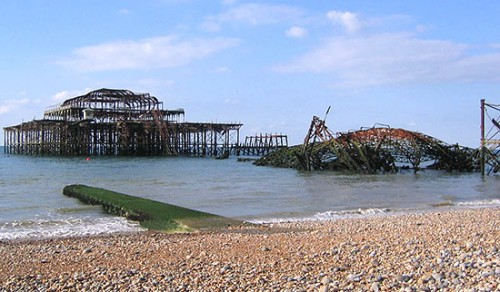

The designers of the London Eye, architects Marks & Barfield, are confident that their upwardly mobile replacement for the wrecked West Pier will be open by 2011. Work has already begun on the i360 project which has already been dubbed an 'iSore' by its critics. It will consist of a 100-person fibreglass pod which will gently rise up a 144 yard tall steel cylinder, giving unmatched views of the city, sea and downs.Marks & Barfield place their design in the tradition of other south coast examples of pioneering architecture (presumably such as the modernist De La Warr Pavilion). The seaside attraction will be topped by wind turbines which will provide some of the power needed to operate it. The West Pier Trust still hopes it will eventually rebuild the elegant pier which was the star of Ken Russell's 'Oh what a lovely war!' as well as featuring in several of the 'Carry On' films.

